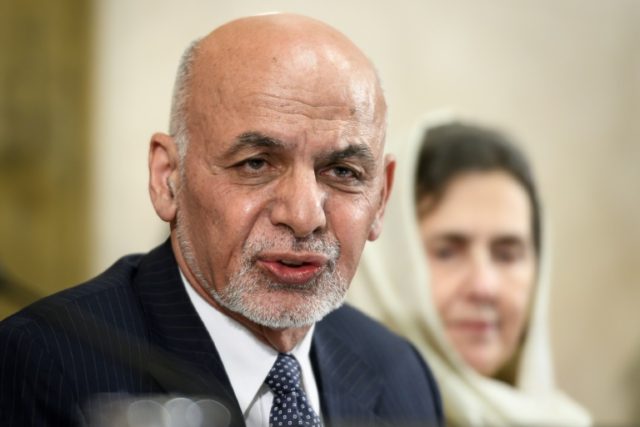The National Security Adviser of Afghanistan on Thursday accused U.S. President Donald Trump’s envoy in charge of peace negotiations with the Taliban of “delegitimizing” and “weakening” the Kabul government during the talks to serve his ambitions of one day running the war-ravaged country.
An official from the U.S. Department of State (DOS) — which oversees the office of U.S. reconciliation envoy Zalmay Khalilzad — denied the assertions by Hamdullah Mohib, Afghan President Ashraf Ghani’s national security adviser who served as ambassador to Washington.
“Mr. Mohib’s comments are inaccurate and unhelpful, and we will be responding to them privately,” a State Department official told the Daily Beast on condition of anonymity.
“His comments do not in any way reflect the high level of U.S.-Afghan coordination on all matters involving peace in Afghanistan,” the official added.
Despite U.S. insistence that Kabul leads and owns the ongoing talks to end the more than 17-year-old conflict — America’s most extended — the Taliban continues to refuse to allow the Afghan government to participate.
Both sides have claimed “progress” in the wake of the longest round of U.S.-Taliban discussions to date, which ended this week. However, it appears Kabul is not happy about being left out.
Referring to Khalilzad, Mohib told reporters on Thursday, “The reason he is delegitimizing the Afghan government and weakening it, and at the same time elevating the Taliban can only have one approach. It’s definitely not for peace. He is not reconciling, he’s alienating.”
The top Afghan official added:
We think either Ambassador Khalilzad doesn’t know how to negotiate and there may be other reasons behind what he’s doing. But what he’s doing is not getting a deal that would result in peace in Afghanistan.
…
Knowing Ambassador Khalilzad’s own personal history, he has ambitions in Afghanistan. He wanted to run for president twice… people in government think perhaps all this talk is to create a caretaker government of which he will then become the Viceroy.
He suggested Khalilzad is not doing his job as Trump’s envoy, noting, “I don’t think the president has instructed to delegitimize the Afghan government. I don’t think the president has instructed to disrespect the Afghan people.”
Instead of convincing the Taliban to engage Kabul during the five times the two sides have officially met since last fall, Khalilzad has sidelined the Afghan government, Mohib complained.
He said Khalilzad has failed to give the Taliban a reason to invite Kabul into the talks as the terrorist group prepares “for a full-on spring offensive” against the U.S.-backed Afghan National Defense and Security Forces (ANDSF). Taliban jihadis have intensified attacks during peace negotiations.
Despite tens of billions of dollars in American funding devoted to its development, the ANDSF — which includes police and army units — continues to struggle against the Taliban.
The ANDSF and Afghan civilians have borne the brunt of the Taliban attacks in recent years, suffering historic casualties.
“Even if there’s a deal, it’s a bad deal” because it would undermine Kabul, Mohib argued.
Meanwhile, he said, the Taliban is boasting that foreign powers are clamoring to meet with them.
On Thursday, Mullah Abdul Ghani Baradar, one of the Taliban’s founders who headed the group’s delegation during the recent round of discussions declared he was optimistic and urged Afghans not to fear a settlement, Reuters reported.
“We are very hopeful for the peace talks, because the latest round had some good dialogues which paved the way to more progress regarding peace in the future,” Baradar declared, according to the Taliban’s website.
Mohib suggested Khalilzad has kept Kabul in the dark about his discussions with the Taliban.
Trump has made the negotiated political reconciliation between Kabul and the Taliban the primary tenet of his administration’s strategy to end the war in Afghanistan — raging since October 2001.
U.S. troops removed the Taliban regime (1996-2001) soon after invading Afghanistan, but a potential reconciliation deal could grant the terrorist group the opportunity to return to power as a legitimate political force.
According to the most recent U.S. government assessment, the Taliban controls or contests more than 45 percent of Afghanistan’s districts and has continued to gain territory amid the peace negotiations.
The recent talks yielded two draft agreements — U.S. withdrawal, without a specified timeline, and assurances by the jihadis that they will not allow international terrorists to operate in Afghanistan.
The Taliban — which is fighting to restore strict Islamic laws or sharia — considers itself the only legitimate government of Afghanistan, dismissing Kabul as an American “puppet.”
In a report published this week, DOS blasted the Taliban for human rights violations in 2018, which the group denies.
“There were numerous reports of torture and cruel, inhuman, and degrading punishment by the Taliban, ISIS-K, and other antigovernment groups,” the report found.
Taliban narco-jihadis have long argued that foreign forces must leave the country before it engages in discussions with Kabul.

COMMENTS
Please let us know if you're having issues with commenting.